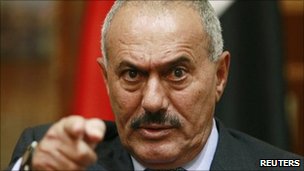| | International 
[ 2011-06-06 ] 

Yemeni and Saudi officials say Mr Saleh will return to Yemen, but analysts say that is in doubt Yemen: Saleh 'recovering from surgery in Saudi Arabia'
Yemen's President Ali Abdullah Saleh is recovering
from surgery in Saudi Arabia to remove shrapnel
from his chest, Saudi officials say.
He was flown to the country on a Saudi medical
flight on Saturday, a day after being wounded in
an attack on his presidential compound in Sanaa.
Thousands of people in Yemen have been celebrating
his departure after weeks of anti-government
protests.
It remains unclear whether Mr Saleh will return to
Yemen.
There were reports he would remain in Saudi Arabia
for two weeks; one week to recover and another for
meetings, but it was not known what he planned to
do after that.
Yemen's deputy information minister, Abdu
al-Janadi, said Mr Saleh would be returning.
"Saleh is in good health, and he may give up the
authority one day but it has to be in a
constitutional way," he said.
Power struggle
Mr Saleh underwent two successful operations on
Sunday on his chest and neck, Saudi officials
said, suggesting he would seek to return to Sanaa
after convalescing.
But even if President Saleh wants to return, it is
unlikely Saudi Arabia will allow him, BBC Middle
East correspondent Jon Leyne says.
Yemeni Vice-President Abd-Rabbu Mansour Hadi has
replaced Mr Saleh in his absence, and is in
command of the armed forces and security
services.
He met US ambassador Gerald Michael Feierstein,
state news agency Saba reported, to discuss "the
importance of co-operation with the [opposition]
Common Forum" alliance.
He may have little real power however, with Mr
Saleh's son and other relatives in charge of key
units of the security forces.
Friday's attack on Mr Saleh came after days of
street battles in Sanaa between government forces
and fighters loyal to Sheikh Sadiq al-Ahmar, head
of the powerful Hashid tribal federation. The
fighting has left more than 160 dead and brought
the country to the brink of civil war.
Early on Monday a truce between the two sides
appeared to be holding.
That power struggle overlaid widespread street
protests that began earlier in the year, inspired
by the uprisings in Tunisia and Egypt, calling for
democratic reforms and an end to Mr Saleh's rule.
As word spread that Mr Saleh had left for Saudi
Arabia, thousands of people in Yemen began
celebrating.
In Sanaa, crowds gathered in University Square -
the epicentre of the protest movement - singing
and dancing and holding placards that celebrated
the president's departure.
The BBC's Jon Leyne: ''You have to doubt Mr Saleh
will ever go back to Yemen''
President Saleh - who at times used brute force to
try to quell demonstrations - had agreed to a deal
brokered by the Gulf Co-operation Council that
would see him step down in return for an amnesty
from prosecution.
However, he has so far refused to sign the deal.
Some analysts say Saudi Arabia will now use his
presence in the country to pressure him to sign
the agreement.
Source - BBC

... go Back | |




